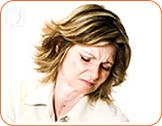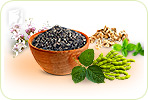
With all the changes your body is undergoing around the time of menopause, it seems only logical that some stress or anxiety may accompany these changes. Not only do your fluctuating hormones cause anxiety chemically, but the combination of your other menopausal symptoms or fear of them may exacerbate anxiety. For instance, anticipating and fearing the onset of a hot flash in public could arouse feelings of anxiety.
Also, many women are lifelong sufferers of menopausal anxiety, so much so that those feelings become “normal”. They may even forget they have anxiety issues until the symptoms worsen at a time like the onset of menopause. If you or someone you know is going through the menopause transition and experiencing feelings of anxiety as a result, read these tips for natural relief before resorting to another risky and expensive prescription.
5 Natural Ways to Relieve Anxiety
Take a Cold Shower

It may not have been scientifically proven, but plenty of people suffering from anxiety and depression claim that taking a cold shower, and particularly washing the head and hair with cool water, helps them to reduces anxiety.
Cod Liver Oil Daily
Cod liver oil contains omega-3 fatty acids, which help to improve cognition when taken habitually. A study from 2007 linked the consumption of cod liver oil to lower levels of depression and anxiety.
Exercise

It has been proven time and time again that exercise releases endorphins and boosts the mood of depressed and anxious people, yet doctors are still weary of “prescribing” exercise.
Go Outside

Turn off the television, turn off the computer. Not only does being in front of a screen all day reduce the amount of melatonin in your body, making it difficult for you to get adequate sleep, but being inside all the time deprives you of nature's natural relaxation.
Get a Hobby
Taking up a simple activity that can help you keep your mind off of whatever may be bothering you can help you avoid anxiety. Reading a book and working at a jigsaw puzzle are all inexpensive activities you can do by yourself.
More Information
Talk with your doctor if you are suffering from symptoms of anxiety during the menopause transition. While anxiety is often an emotional issue, could more and more research shows that it can be related to a hormonal imbalance: balancing hormones is a tricky matter and the introduction of synthesized hormones into the body should not be taken lightly.
Sources
- National Institute of Mental Health.(n.d)."Anxiety Disorder".Retrieved from www.nimh.nih.gov
- MedicineNet.(n.d)."Generalized Anxiety Disorder".Retrieved from MedicineNet.com
- Dr. Pick, Marcelle.(n.d). "Anxiety in Women-Causes, symptoms, and natural relief".Retrieved from www.womentowomen.com



